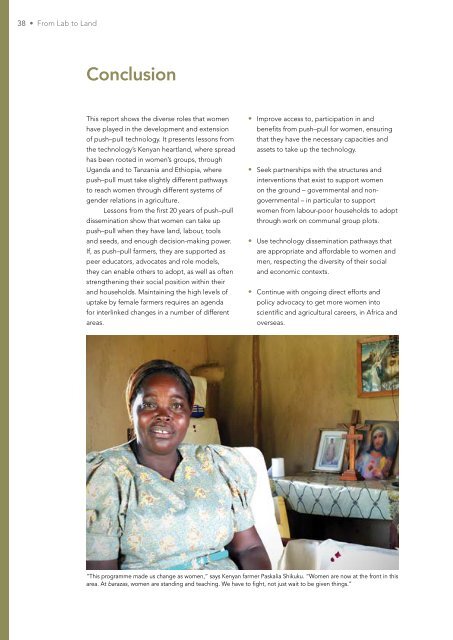to Land
women_in_push-pull
women_in_push-pull
Create successful ePaper yourself
Turn your PDF publications into a flip-book with our unique Google optimized e-Paper software.
38 • From Lab <strong>to</strong> <strong>Land</strong><br />
Conclusion<br />
This report shows the diverse roles that women<br />
have played in the development and extension<br />
of push–pull technology. It presents lessons from<br />
the technology’s Kenyan heartland, where spread<br />
has been rooted in women’s groups, through<br />
Uganda and <strong>to</strong> Tanzania and Ethiopia, where<br />
push–pull must take slightly different pathways<br />
<strong>to</strong> reach women through different systems of<br />
gender relations in agriculture.<br />
Lessons from the first 20 years of push–pull<br />
dissemination show that women can take up<br />
push–pull when they have land, labour, <strong>to</strong>ols<br />
and seeds, and enough decision-making power.<br />
If, as push–pull farmers, they are supported as<br />
peer educa<strong>to</strong>rs, advocates and role models,<br />
they can enable others <strong>to</strong> adopt, as well as often<br />
strengthening their social position within their<br />
and households. Maintaining the high levels of<br />
uptake by female farmers requires an agenda<br />
for interlinked changes in a number of different<br />
areas.<br />
• Improve access <strong>to</strong>, participation in and<br />
benefits from push–pull for women, ensuring<br />
that they have the necessary capacities and<br />
assets <strong>to</strong> take up the technology.<br />
• Seek partnerships with the structures and<br />
interventions that exist <strong>to</strong> support women<br />
on the ground – governmental and nongovernmental<br />
– in particular <strong>to</strong> support<br />
women from labour-poor households <strong>to</strong> adopt<br />
through work on communal group plots.<br />
• Use technology dissemination pathways that<br />
are appropriate and affordable <strong>to</strong> women and<br />
men, respecting the diversity of their social<br />
and economic contexts.<br />
• Continue with ongoing direct efforts and<br />
policy advocacy <strong>to</strong> get more women in<strong>to</strong><br />
scientific and agricultural careers, in Africa and<br />
overseas.<br />
“This programme made us change as women,” says Kenyan farmer Paskalia Shikuku. “Women are now at the front in this<br />
area. At barazas, women are standing and teaching. We have <strong>to</strong> fight, not just wait <strong>to</strong> be given things.”


